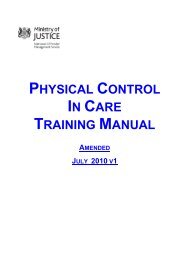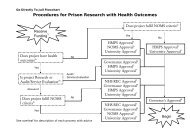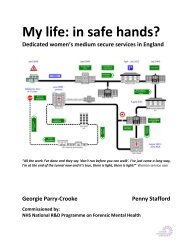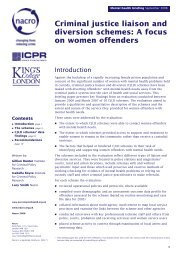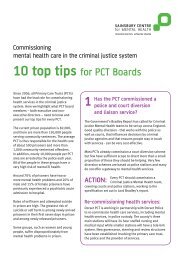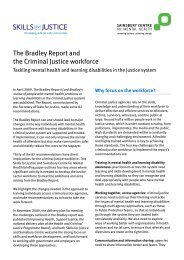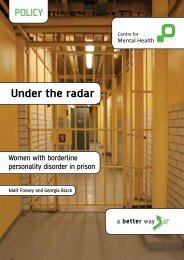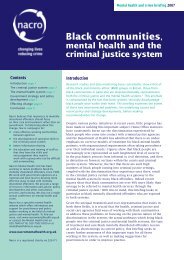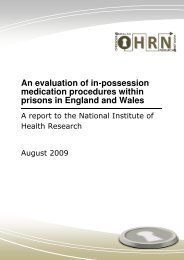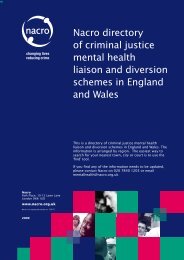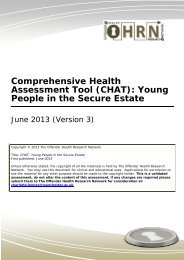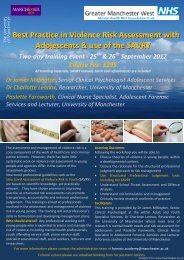Engendering Justice - from Policy to Practice - The Fawcett Society
Engendering Justice - from Policy to Practice - The Fawcett Society
Engendering Justice - from Policy to Practice - The Fawcett Society
- No tags were found...
Create successful ePaper yourself
Turn your PDF publications into a flip-book with our unique Google optimized e-Paper software.
Chapter Four:Women Need <strong>Justice</strong> - Women as Victims of CrimeThis is often used as a weapon by the defence with noalternative explanation being provided <strong>to</strong> the jury. Dates andtimes are especially an issue for trafficked women and anywoman who has had their access <strong>to</strong> news sources, whichprovide a reference point, restricted.In rape cases, a jury is frequently required <strong>to</strong> considerwhether a complainant consented and <strong>to</strong> evaluatethe reasonableness of the defendant’s belief that thecomplainant had consented. <strong>The</strong> definition of consentprovided under the Sexual Offences Act 2003 requires thatan individual must have the freedom and the capacity <strong>to</strong>make a choice. No further guidance is currently provided.Recent research using mock jurors revealed that there wasno consensus on the meaning of consent, particularly inrelation <strong>to</strong> the level of inebriation which may be required.Worryingly, some participants indicated that they wouldrequire some evidence of resistance even when thecomplainant was heavily in<strong>to</strong>xicated. 173 It is also unclearas <strong>to</strong> the extent <strong>to</strong> which defendants pleading a consentdefence, are being tested, as the law requires, on the stepsthey <strong>to</strong>ok <strong>to</strong> ensure consent was given.<strong>The</strong> decision of the Court of Appeal in R v Bree consideredthe line <strong>to</strong> be drawn between consensual sex and rapewhere a complainant is heavily in<strong>to</strong>xicated. <strong>The</strong> Court ofAppeal found that the jury should have been given someassistance with “the meaning of ‘capacity’ . . . where thecomplainant was affected by her own voluntarily inducedin<strong>to</strong>xication and also whether, and <strong>to</strong> what extent theycould take that in<strong>to</strong> account in deciding whether she hadconsented.” 174 Given the stereotypes and moral judgmentswhich surround this issue, there is a need for clear guidanceand clarity as <strong>to</strong> the instruction which should be given <strong>to</strong>jurors, in rape cases involving in<strong>to</strong>xication.In 2006, the Office for Criminal <strong>Justice</strong> Reform publisheda report proposing the introduction of expert evidence inrape cases <strong>to</strong> educate juries about the potential effects oftrauma and <strong>to</strong> assist in dispelling some of the myths andstereotypes which surround rape. Various arguments havebeen made as <strong>to</strong> whether expert testimony is appropriate.Concerns have been raised that the use of expert testimonywould lead <strong>to</strong> a ‘battle of experts’ or may result in anotherbarrier <strong>to</strong> reporting for those women who do not feel theymeet the victim ‘profile’. However, a study with over 200mock jurors indicated that judicial instruction / experttestimony which provided explanation of behaviour resultedin participants being less likely <strong>to</strong> assume fabrication by thevictim. 175<strong>The</strong> Commission welcomes the current work by theGovernment <strong>to</strong> explore commonly held myths and <strong>to</strong>consider appropriate judicial instruction. <strong>The</strong> recognition bythe Courts of this is also encouraging, such as the Cour<strong>to</strong>f Appeal decision, R v Doody, in Oc<strong>to</strong>ber 2008, when theCourt ruled that judges in rape trials can give instruction <strong>to</strong>jurors that a delay in making a rape allegation, rather thanindicating a false complaint, can arise <strong>from</strong> shame andguilt. 176 <strong>The</strong>re should be greater awareness of this decisionand the Commission recommends that the application andinterpretation of this decision is closely moni<strong>to</strong>red. In ligh<strong>to</strong>f the results of this moni<strong>to</strong>ring, the Government may need<strong>to</strong> consider further the use of expert testimony, particularlyin relation <strong>to</strong> issues outside the scope of the decision.<strong>The</strong>re is a great deal of expertise within this sec<strong>to</strong>r whichcould be utilised <strong>to</strong> provide independent expert evidence <strong>to</strong>juries and instil greater confidence of victims in the system.Evidence could be required by the court, rather than byeither side, as is possible in childcare cases, which wouldalleviate the risk of a battle of experts developing.I’d like the CPS <strong>to</strong> s<strong>to</strong>p making assumptions about whata jury would think. I’d like juries <strong>to</strong> be educated that mostwomen who are raped know their perpetra<strong>to</strong>rs, that thereis a big difference between submitting because you’re soterrified that you’ll do anything <strong>to</strong> get out of there alive andconsent.Female rape victim, Questionnaire Response, January2009Page 60



